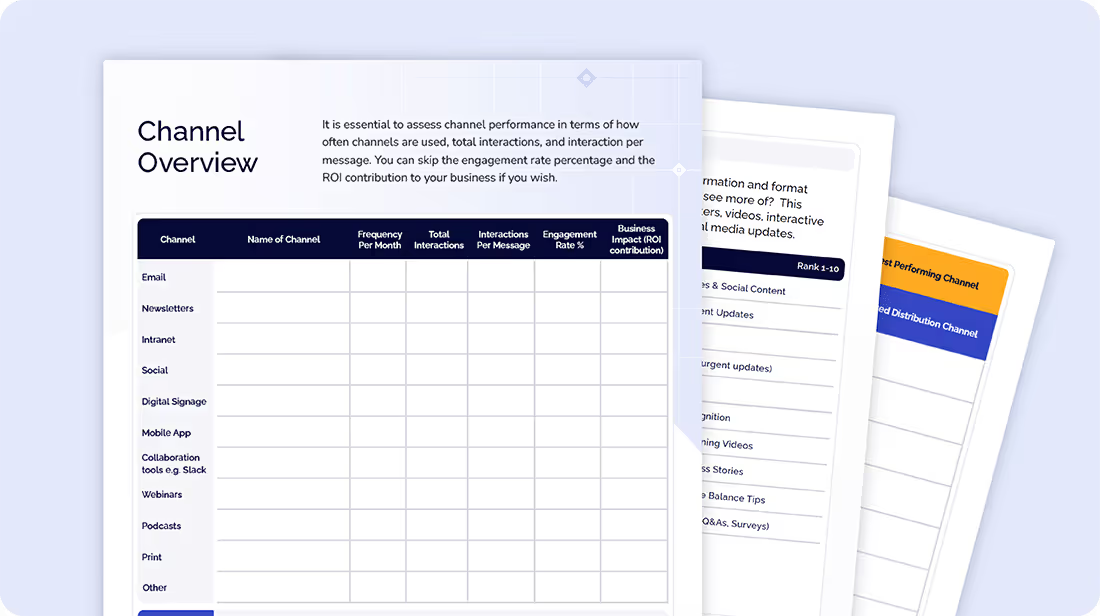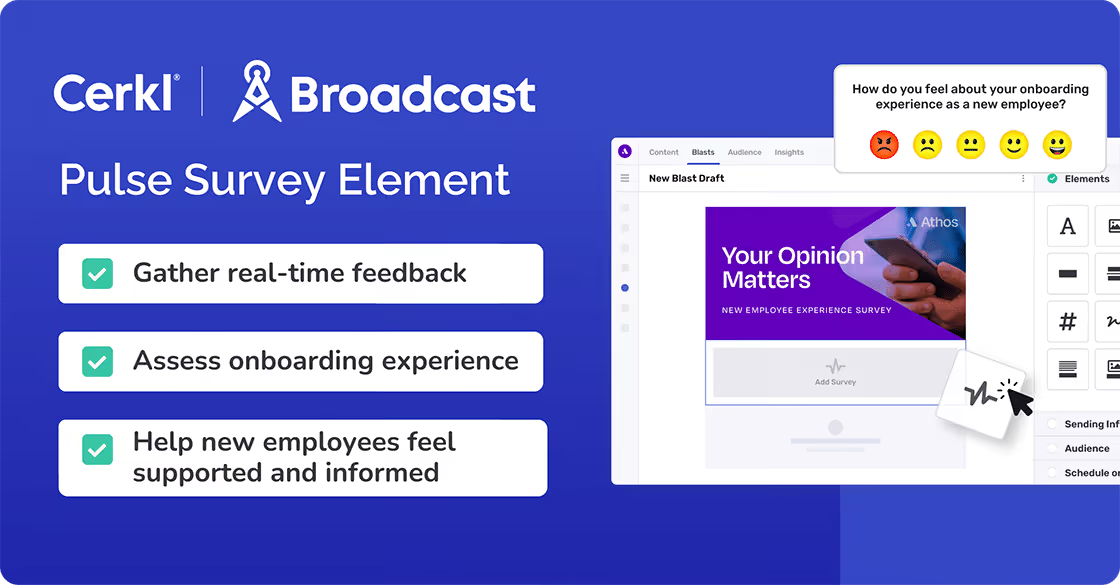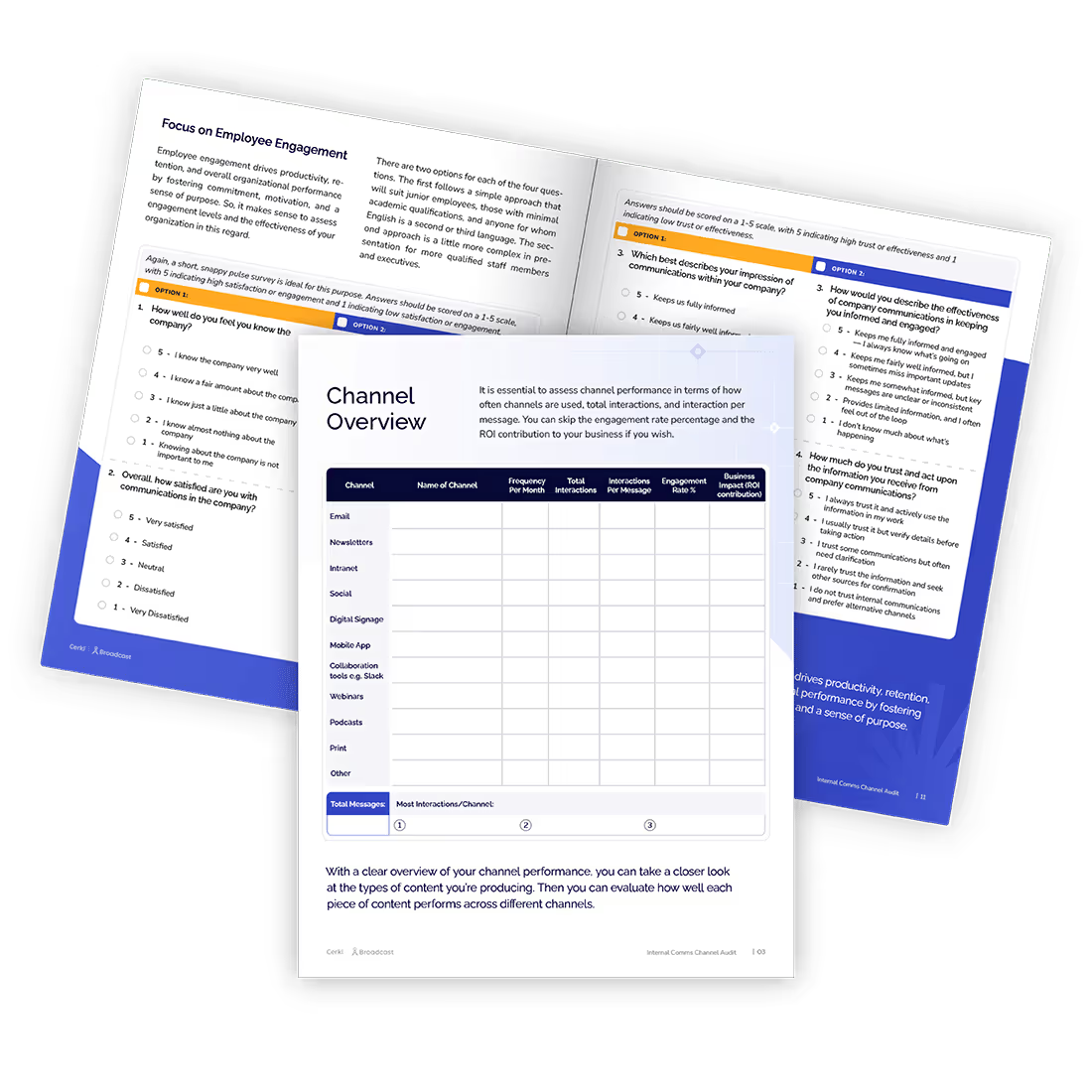10 Internal Communications Job Descriptions to Fill Key Roles in 2025
The importance of an internal communications job description lies in attracting the right talent and ensuring clear responsibilities for organizational success.

.avif)
Audit Your Internal Communications
Strategy is an important component of internal communications. Ensure you’re communicating through the right channels at the right frequency with our Internal Communications Channel Audit worksheet.
Access Now →In today’s fast-paced work environment, internal communications (IC) is essential for aligning employees with company goals, fostering engagement, and maintaining consistent messaging. It also shapes company culture by promoting transparency and collaboration, which are key to employee satisfaction and retention.
However, the structure of an IC department depends on the size and needs of the organization. Larger companies may have specialized IC roles, while smaller ones may rely on individuals managing multiple functions. Regardless of size, clearly defined roles and responsibilities are crucial for ensuring that internal communication remains consistent and aligned with the company’s objectives, making it vital to hire the right talent.

To ensure success, companies must select the right candidates for IC roles by clearly defining each position's responsibilities and expectations. Well-crafted job descriptions not only attract the best talent but also help new hires quickly understand their roles and contribute to the company’s communication strategies from day one. Tailoring these descriptions to the organization’s specific needs guarantees that IC professionals are equipped to drive effective communication and engagement.
Free Internal Comms Audit Template to Improve Engagement
Upgrade your company’s internal comms to enhance employee communication

Download Free
Internal Communications Roles
Internal communications roles are essential for aligning employees with an organization’s vision, goals, and values. From strategists to specialists managing channels like newsletters, IC professionals work to foster transparency, encourage feedback, and enhance team collaboration. As workplaces evolve with remote and hybrid models, IC roles now encompass digital strategies and tech-driven solutions, making them critical to success. Clearly defining these roles ensures businesses can leverage the right talent for each communication challenge.

In this post, we explore the top 10 internal communications job descriptions and why well-defined roles are key to building a strong IC team in 2025. Salary figures were sourced from Glassdoor.
Note that these job descriptions are generic and should be tailored to your company’s unique goals and communication strategy. It is unlikely that any one organization would offer all these roles.
#1 Internal Communications Manager
Average annual salary: $94,265
Role Overview
As the Internal Communications Manager, you will lead the development and execution of the organization’s internal communications strategy, ensuring all messaging is clear, consistent, and aligned with company goals. This role requires working closely with senior leaders, and managing a team of specialists to foster employee engagement and strengthen company culture.
Key Responsibilities
- Develop and implement IC strategies and content, including email, newsletters, and presentations.
- Lead a team of communications specialists and collaborate with senior leadership to align messaging with business objectives.
- Oversee crisis communications and ensure accurate, timely information dissemination.
- Monitor and measure communication effectiveness, adjusting strategies based on feedback.
- Manage IC tools and events to promote engagement and company culture.
Skills and Qualifications
- Bachelor’s degree in communications or a related field.
- 5+ years of experience in internal communications, with 2+ years of team management.
- Strong writing, editing, and project management skills.
- Experience with communication tools such as internal email software and intranets.
#2 Internal Communications Specialist
Average annual salary: $82,227
Role Overview
As an Internal Communications Specialist, you will be responsible for executing and managing the IC strategy, working closely with the internal communications manager and key stakeholders to create engaging content. This role focuses on delivering consistent, impactful messaging across multiple channels to ensure alignment with the organization’s values and goals.
Key Responsibilities
- Collaborate with the internal communications manager to develop and implement communication plans.
- Create and deliver IC content, including newsletters, emails, intranet updates, and presentations.
- Work with stakeholders to ensure communication is clear, consistent, and aligned with company goals.
- Monitor and assess the effectiveness of IC strategies, providing recommendations for improvement.
- Assist the internal communications manager with crisis communications and employee engagement initiatives.
Skills and Qualifications
- Bachelor's degree in communications or a related field.
- 3+ years of experience in internal communications.
- Strong writing, editing, and project management skills.
- Proficiency with IC tools such as email platforms and intranet systems.
- Ability to work effectively with the internal communications manager and various departments.
#3 Corporate Communications Intern
Average annual salary: $51,931
Role Overview
As a Corporate Communications Intern, you will gain hands-on experience by supporting the IC team with daily tasks and projects. This role offers exposure to various aspects of corporate and internal communications, allowing you to contribute fresh ideas while learning from experienced professionals.
Key Responsibilities
- Assist the Internal Communications Manager and team with content creation, platform management, and communication campaigns.
- Provide creative input on IC strategies and help execute various tactics.
- Participate in cross-functional initiatives to gain insights into different areas of internal communications.
- Support daily tasks such as drafting newsletters, monitoring IC channels, and helping with employee engagement activities.
Skills and Qualifications
- Excellent written and verbal communication skills.
- Enthusiasm for learning and an interest in corporate communications.
- Ability to multitask and work in a fast-paced environment.
- Proficiency with Microsoft Office and internal communication tools such as intranets.
#4 Internal Communications Lead
Average annual salary: $125,852
Role Overview
As the Internal Communications Lead, you will oversee the tactical execution of IC strategies, acting as the bridge between high-level strategy and day-to-day implementation. You will manage the IC team to ensure that messaging is consistent, impactful, and aligned with the organization’s goals.
Key Responsibilities
- Develop and manage the IC calendar, ensuring timely content production and delivery.
- Act as the subject-matter expert on IC best practices, providing guidance and training to the team.
- Implement communication strategies across various channels to maximize reach and effectiveness.
- Collaborate with stakeholders to meet communication objectives and align internal messaging with external branding efforts.
Skills and Qualifications
- Strong project management and organizational skills.
- Ability to balance strategic planning with hands-on execution.
- Excellent interpersonal and cross-functional collaboration skills.
- Attention to detail and quality control in all internal communications.
#5 Internal Communications Executive
Average annual salary: $85,842 in the U.S.
Role Overview
As an Internal Communications Executive, you will be responsible for executing IC strategies, ensuring alignment with the company’s goals, and fostering a positive workplace culture. You will work closely with the Internal Communications Manager to create, curate, and distribute key messages across various channels, driving employee engagement and organizational alignment.
Key Responsibilities
- Support the Internal Communications Manager in executing the IC strategy.
- Create and manage content for internal newsletters, emails, and intranet updates.
- Coordinate communication efforts between departments to ensure consistent messaging.
- Assist with internal events and initiatives to promote employee engagement and company culture.
- Measure the effectiveness of IC and provide insights for improvement.
Skills and Qualifications
- Bachelor’s degree in communications or a related field.
- 2+ years of experience in internal or corporate communications.
- Strong writing, editing, and content creation skills.
- Experience with communication platforms like email, intranet, and internal messaging tools.
- Ability to collaborate effectively with different departments and stakeholders.
#6 Associate Director of Internal Communications
Average annual salary: $135,451
Role Overview
As the Associate Director of Internal Communications, you will support the strategic development and execution of the organization’s IC efforts, ensuring alignment with company goals. Working closely with the Internal Communications Director and senior leadership, you will help lead the IC team and guide the creation of content that strengthens company culture and drives employee engagement.
Key Responsibilities
- Assist the Internal Communications Director in developing and executing the overall communications strategy.
- Provide strategic guidance to the communications team, ensuring consistent and aligned messaging across the organization.
- Collaborate with senior leadership to ensure IC supports business objectives and company values.
- Manage IC tools and monitor the effectiveness of communication efforts.
- Oversee internal events and initiatives to enhance employee engagement and promote a positive workplace culture.
Skills and Qualifications
- Bachelor’s degree in communications or a related field.
- 6+ years of experience in internal communications, with 2+ years in a leadership role.
- Strong writing, editing, and project management skills.
- Ability to collaborate effectively with senior leaders and multiple departments.
- Experience with IC tools, such as intranet and internal email platforms.
#7 Internal Communications Director
Average annual salary: $216,500
Role Overview
As the Internal Communications Director, you will lead the development of the organization's overarching internal communications strategy, ensuring that all communications are aligned with business goals and support a cohesive company culture. Unlike the Associate Director, who focuses more on supporting strategy execution and team management, the Director is responsible for setting the strategic direction and acting as a key advisor to senior leadership on communication matters.
Key Responsibilities
- Develop and lead the overall IC strategy, aligning with business goals.
- Act as a trusted advisor to senior leadership on communication methods and employee engagement tactics.
- Oversee the execution of communication plans, ensuring consistency and alignment with the company’s objectives.
- Implement tools and systems to enhance collaboration and employee engagement.
- Mentor and guide the IC team, promoting professional growth and development.
Skills and Qualifications
- Bachelor’s degree in communications or a related field.
- 8+ years of experience in internal communications, with proven leadership in managing teams.
- Strong strategic thinking, public speaking, and executive-level communication skills.
- Extensive experience with communication tools and platforms.
- Expertise in stakeholder management and building executive relationships.
#8 Head of Internal Communications
Average annual salary: $119,611
Role Overview
The Head of Internal Communications is responsible for shaping and driving the IC strategy, ensuring it aligns with corporate objectives and fosters a transparent, engaging workplace culture. As the leader of the IC team, the Head sets the standard for clear and compelling internal messaging that resonates across all levels of the organization.
Key Responsibilities
- Develop and oversee the execution of a comprehensive IC strategy that supports corporate goals.
- Lead a team of communications professionals, guiding the planning and implementation of communication initiatives.
- Foster a culture of open communication and employee engagement, ensuring alignment with the company’s vision and values.
- Manage budget and resources for the IC department, ensuring efficient operations.
- Identify opportunities for innovation and improvement in IC processes and tools.
Skills and Qualifications
- Proven leadership experience in internal communications, with a history of managing and inspiring teams.
- Strong strategic thinking and the ability to develop and execute comprehensive communication strategies.
- Visionary leadership skills to ensure the team stays ahead of industry communication trends.
- Excellent ability to foster a communicative, transparent company culture.
#9 Vice President of Internal Communications (VP)
Average annual salary: $166,935
Role Overview
As the VP of Internal Communications, you will lead the development and execution of the company’s IC strategy, working closely with senior executives and key stakeholders to ensure that all messaging is clear, consistent, and aligned with business goals. In this high-level role, you will drive employee engagement, shape company culture, and guide a team of communications professionals to execute strategic internal narratives.
Key Responsibilities
- Develop and implement strategic IC plans, aligning messaging with corporate goals and values.
- Lead and provide strategic direction to the IC team, ensuring clear, consistent communication across all channels.
- Partner with senior executives to ensure IC supports business objectives and cultural values.
- Oversee crisis communications and serve as the company’s spokesperson on IC matters.
- Continuously evaluate and improve communication practices to enhance leadership communication and employee engagement.
Skills and Qualifications
- Bachelor’s degree in communications or related field.
- 10+ years of experience in internal communications, with 5+ years in a leadership role.
- Proven expertise in narrative shaping, executive communication, and employee engagement.
- Deep knowledge of communication trends and emerging technologies.
- Strong leadership, project management, and cross-functional collaboration skills.
#10 Chief Communications Officer (CCO)
Average annual salary: $158,752
Role Overview
As the Chief Communications Officer (CCO), you will oversee the organization’s IC strategy, aligning it with broader corporate goals and ensuring consistent messaging that fosters employee engagement and a strong company culture. You will work closely with the executive team to develop a compelling corporate narrative and lead high-level communication initiatives that impact the entire organization.
Key Responsibilities
- Develop and implement a strategic IC plan that aligns with corporate objectives.
- Lead the IC team, providing guidance on content creation, messaging, and overall strategy.
- Collaborate with the C-suite and senior executives to ensure communication supports the company’s mission, values, and business objectives.
- Oversee crisis communications and serve as the organization’s internal spokesperson.
- Continuously evaluate and improve IC processes, staying current with industry trends and best practices.
Skills and Qualifications
- Bachelor’s degree in communications or related field; advanced degrees preferred.
- 15+ years of experience in internal or corporate communications, with 8+ years in a leadership role.
- Proven ability to lead large teams and manage high-profile communication initiatives.
- Expertise in content strategy, corporate storytelling, and change management.
- Strong leadership and collaboration skills, with a visionary approach to communication strategy.

Importance of Delivering the Best Onboarding Experience
Delivering a top-notch onboarding experience is crucial for setting up new IC hires for success. A well-structured onboarding process not only helps them understand the company’s communication goals and culture but also equips them with the tools and knowledge needed to effectively contribute from day one.
However, to excel in their roles, IC professionals need to master a comprehensive stack of tools that support effective communication, engagement, and feedback within the organization. These tools are critical for managing everything from email campaigns and messaging strategies to employee engagement and analytics. Familiarizing new IC hires with this stack of essential platforms will ensure they are fully equipped to contribute from day one.
At the heart of these tools is the ability to streamline communication processes, personalize messages, and gather meaningful feedback to align with company culture and goals. Mastery of such platforms enables IC professionals to deliver clear, consistent messaging, maintain employee engagement, and drive internal alignment. These are all key to the success of internal communications strategies.
Free Internal Comms Audit Template to Improve Engagement
Upgrade your company’s internal comms to enhance employee communication

Download Free
How Cerkl Broadcast Helps with Onboarding New Employees
Among the tools that every IC professional must know, Cerkl Broadcast stands out as a platform custom-designed for internal communication needs. From day one, Broadcast allows IC teams to simplify complex tasks like onboarding through personalized Email Blasts, delivering key messages directly to new employees. This ensures that new hires immediately receive the information they need to integrate into the company’s culture.
Beyond delivering messages, Cerkl Broadcast offers powerful tools such as Pulse Surveys to gather real-time feedback from new employees, allowing IC teams to assess the effectiveness of the onboarding process. These features, alongside its ability to personalize communications at scale, make Cerkl Broadcast a must-have tool for any internal communications professional aiming to create a connected and informed workforce. It also ensures that new employees feel supported and informed, helping them quickly integrate into the company culture.

What’s Next?
To evaluate and optimize your internal communications strategy, download Cerkl’s free communications audit. This audit will help you identify areas for improvement and determine if there’s a need to expand your internal communications team to better support your organization’s goals. By understanding your current strategy, you can make informed decisions about enhancing your communication efforts and ensuring your team is effectively aligned.

Free Internal Comms Audit Template to Improve Engagement
Upgrade your company’s internal comms to enhance employee communication
Download Free
FAQ
Is there an internal communication role? Yes, internal communication plays a crucial role in ensuring that employees are informed, engaged, and aligned with organizational goals. Whether the job is internal communications manager or intern, these roles are vital for fostering transparency and enhancing employee engagement within a company.
What are the 5 main internal communications roles? The five main internal communication roles are Internal Communications Manager, Internal Communications Specialist, Employee Engagement Manager, and Communications Coordinator. Each role focuses on different aspects such as strategy, content creation, employee engagement, and facilitating smooth information flow within the organization.
What does an internal communication specialist do? An internal communication specialist is responsible for crafting and distributing messages that keep employees informed, engaged, and aligned with company goals. They also measure the effectiveness of internal communications and collaborate across departments to ensure messaging consistency and clarity.
What is a typical internal communications job description? A typical internal communications job description involves developing and executing strategies to effectively communicate key messages to employees, ensuring alignment with organizational goals and values. Responsibilities include crafting engaging content, managing communication channels, and fostering a transparent, informed, and connected workplace culture.








.avif)
